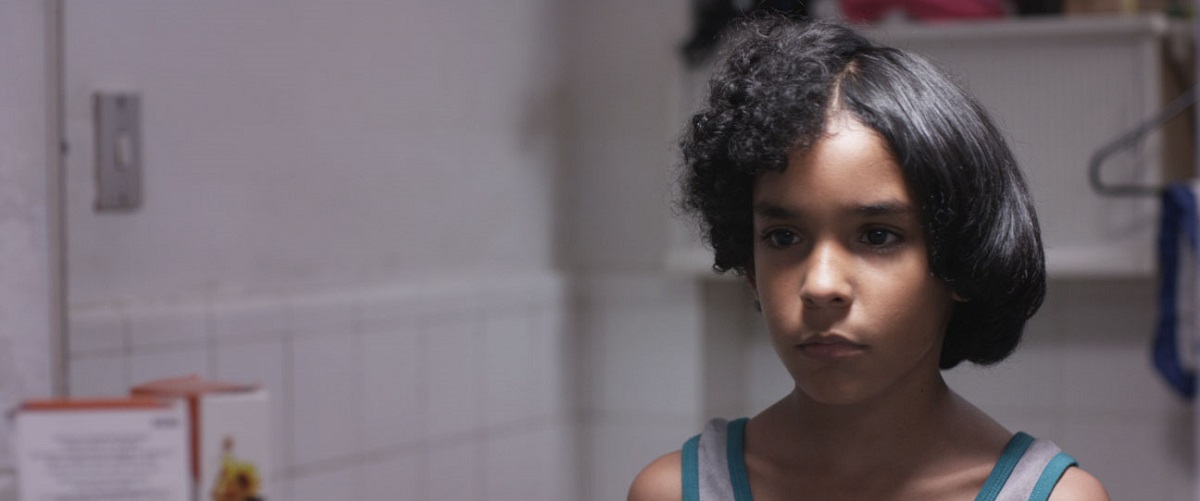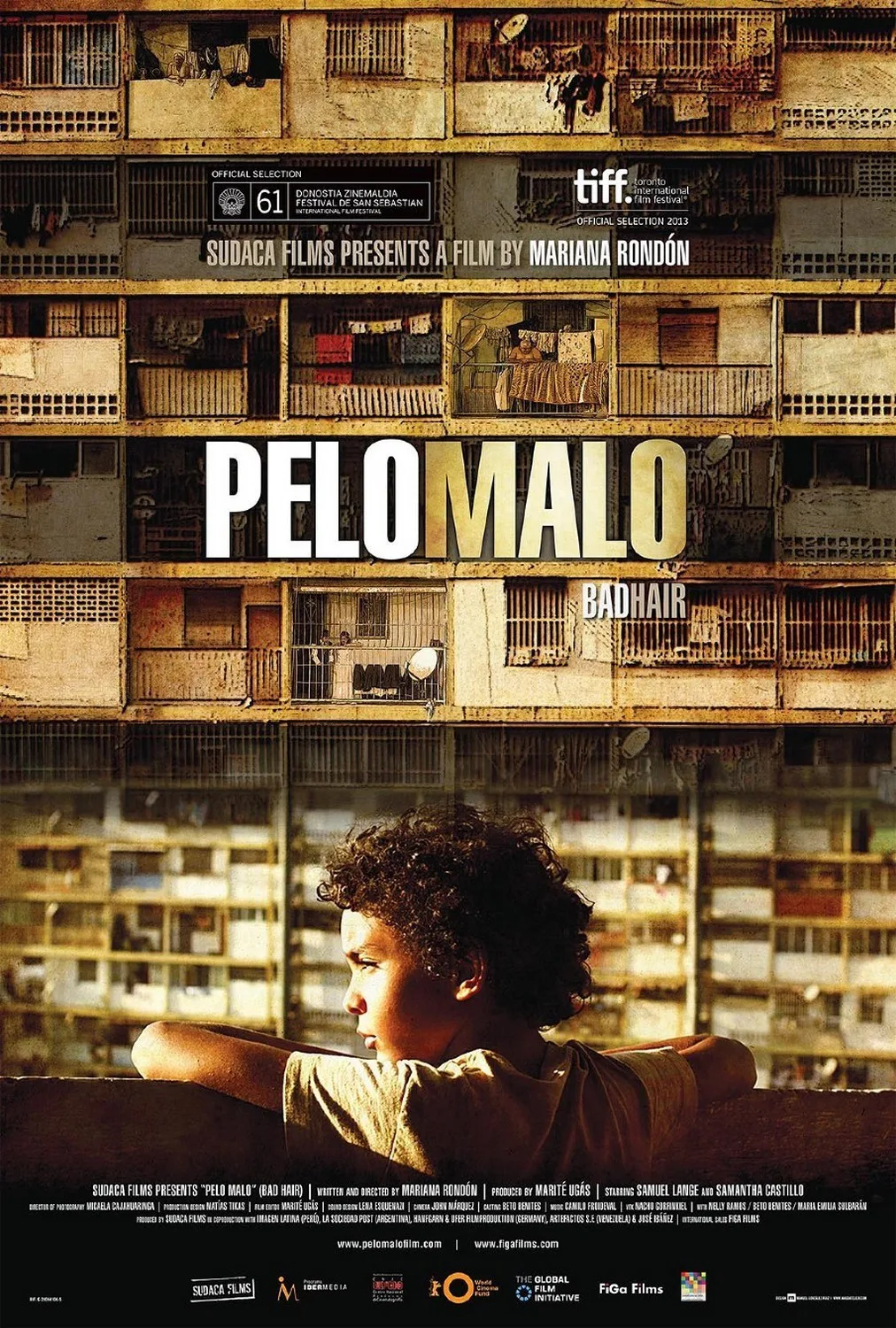Junior (Samuel Lange Zambrano), a nine-year-old boy living in a housing project in Caracas, wants to straighten his wild curls. He pours mayonnaise and oil on his hair, and struggles to get a comb through. He experiments with his grandmother’s blow dryer. Junior’s mother Marta (Samantha Castillo), harassed and exhausted, sees her son’s obsession with his hair as an ominous sign. When she looks at him, more often than not it is with an expression of disgust. His hair is from his black father, no longer in the picture. Marta has another baby, seemingly from a different father, and the baby has long straight hair. Marta showers the baby with love and affection, all as Junior looks on from the next room. Maybe if his hair was straight, his mother would love him. Mariana Rondón‘s “Bad Hair” is a stark and often brutal look at one boy’s pre-sexual awakening of identity and how that impacts his life. What is it like to know who you are before you understand what that will mean? Populated with totally naturalistic performances, and a stunningly observed relationship between mother and son (their scenes together are phenomenal), “Bad Hair” works by keeping its focus on the small details of everyday life and its rhythms. It is not didactic about sexuality, and it does not sentimentalize childhood or its main child character.
Shot by Micaela Cajahuaringa with an intensely realistic style, “Bad Hair” presents a world that is overcrowded, loud, and chaotic. People don’t have time to think in this cacophony. There is no room to breathe. Poverty and overcrowding grind people down. The highways are clogged with cars, and the gigantic dilapidated tenement buildings loom high, surrounded by the vast space of basketball courts and parking lots. Early on, Junior and his best friend (Maria Emilia Sulbaran) stand on his balcony, staring at the wall of windows across the way, the sheer sea of diverse humanity on display, packed on top of one another, and they speculate on the lives everyone leads over there. They are children and they don’t understand everything but they see all.
Early on, there’s a scene where a group of rowdy boys in the housing project blast music and break-dance. Junior stands on the sidelines watching, enjoying himself, and then slowly starts to sway, closing his eyes and raising his arms. It is in total contrast to the jagged hip-hop energy of the other boys, but in such a moment Junior is being himself. It is pure joy. Marta comes across this scene, takes one look at how different Junior looks from everyone else, and drags him away, asking him why he has to dance like that. He doesn’t know.
School is about to start, and all children need to have an ID photo taken. Junior and his little friend fantasize about their photos; it is a major topic of conversation. Junior is determined to have straight hair for the photo. His friend sees nothing wrong with that. She loves her own hair, and puts little clips and barrettes in it, and the two of them loll about all day watching beauty pageants together on television. He locks himself in the bathroom and experiments with different straightening products, all as Marta bangs on the door furiously.
Marta’s hothead grim personality may be why she lost her job. She is under investigation for some type of misbehavior, and she is desperate to get the job back. She drops Junior and the baby off with a neighbor, or, more reluctantly, with Junior’s paternal grandmother Carmen (Nelly Ramos). Carmen encourages the parts of Junior that Marta despises. She plays him pop songs, and dances around, singing into a hairbrush. She straightens his hair for him, too, warning him to put water on it before Marta arrives to pick him up. There are wary scenes of mutual suspicion between the two women. Carmen suggests that Junior come live with her for good. “He likes to look nice and dress up,” Carmen says bluntly. “You don’t like that.”
Junior is at the mercy of the adults around him. Marta is unpredictable: she is rough and mean, indifferent and impatient, but on a dime she can suddenly turn tender and caring. Dealing with his mother is like tiptoeing through a landmine, and when she lashes out, Junior recoils, not understanding what he has done. Marta’s most horrible and unforgivable choice comes out of thinking it is what Junior needs. Her former boss notices the contemptuous way she treats Junior and comments on it. She balks: “I need to be a role model for my kids.” She does not understand what she is doing. Samantha Castillo is fearless in what is an extremely unpleasant and complex role.
Marta and Junior are locked in a battle of the wills. The hair becomes the symbol of the much larger issue that Marta senses (and Junior is too young to realize). It is a macho and rough world and Marta thinks her son is too effeminate. Junior’s innocent crush on the teenage boy who runs the newsstand in the projects is seen as an incredibly sinister development. To Junior, he just wants straight hair and wants to look fabulous in his school photo. He is struggling to blossom. Little Samuel Lange Zambrano is a revelation. He stares at his mother for long periods of time as she sews on the couch, and you can see his entire universe—betrayal and sadness and longing for her—on his face. He is an amazing young actor.
Told in a slow and deliberate manner, with documentary-style realism, “Bad Hair” is not conventional storytelling, but it is all the more effective because of that. The scenes between Marta and Junior, often playing out in one take, are rich with behavior, and sharp glances, sudden changes in mood (sometimes violent) and spontaneous reactions in the moment. Their dynamic feels dangerous, a live wire coiling about the room. Mariana Rondón has created a powerful and very human story about a young child’s growing sense of self, and his innocent and baffled reactions to adult resistance and cruelty. “Bad Hair” is extremely provocative in its quiet way, and pulls none of its punches. What will happen to Junior, I found myself worrying. Can’t everyone just let him be? Rondón, a major talent, is not afraid to follow her story to its logically bleak conclusion, but the end-credits sequence suggests hope.




















